I’m guessing you don’t need my opinion on Donald Trump’s proposed ban of all Muslims from entering the United States – you’ve probably heard the full gamut, from Steve King to Bernie Sanders. My first thought was for all of the Muslim students I have known and met, both natural born U.S. citizens and visa holders from countries like Afghanistan, Pakistan, Palestine, and others. I hear this insane rhetoric, growing louder by the day, and I think of a young fellow from Afghanistan – about the nicest person you could hope to meet – and what his thoughts might be about the people who “liberated” his country, then overstayed their welcome for 14 years.
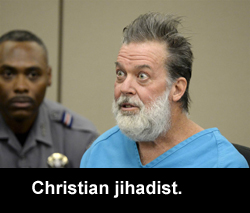 This is what happens in America when anything like a foreign-inspired terror attack takes place: we want to corral all Muslims and start bombing some country most of us couldn’t find on a globe with both hands. I’ve lived through many cycles of this, from the Iran hostage crisis through the first gulf war, to the embassy bombings in the late 1990s and on into the 9/11 era. I can remember a Muslim friend from Bosnia being a bit taken aback by the rhetoric and the kind of full-on nationalism pushed through the corporate media that came about after Clinton bombed Iraq in 1998. It’s times like these when Muslims – and yes, people with beards and headscarves more generally – feel compelled to start looking over their shoulders.
This is what happens in America when anything like a foreign-inspired terror attack takes place: we want to corral all Muslims and start bombing some country most of us couldn’t find on a globe with both hands. I’ve lived through many cycles of this, from the Iran hostage crisis through the first gulf war, to the embassy bombings in the late 1990s and on into the 9/11 era. I can remember a Muslim friend from Bosnia being a bit taken aback by the rhetoric and the kind of full-on nationalism pushed through the corporate media that came about after Clinton bombed Iraq in 1998. It’s times like these when Muslims – and yes, people with beards and headscarves more generally – feel compelled to start looking over their shoulders.
There’s a push, primarily by Republicans but with Democratic assent as well, to view international terrorism and specifically ISIS as a grave, even existential threat to citizens of the United States. Opinion polls have been showing that this is paying off – people are good and scared, which is music to ISIS’s ears. But what the hell – thousands of people in America are killed by the domestic terror of gun violence every year, some of it motivated in part by extremist religion. I would say that that was more unambiguously the case in the Colorado Planned Parenthood shooting than in the San Bernardino attack, just on the basis of the rantings of the shooter, Robert Dear. We are far more likely to be shot by someone like Dear than by someone like Farook.
So … why are we encouraged to fear the lesser danger? It’s the political magic of otherness. Always a winner in America.
luv u,
jp

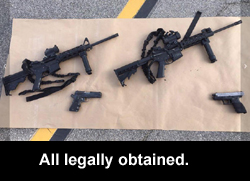 Much as the press is obsessing over the terrorism / not-terrorism question, this is in essence another story of the proverbial three-foot creep with a four-foot gun. That these people were prepared for some kind of attack seems clear, but what they had was not all that exotic except in the respect that there was an awful lot of it – something like 4,500 rounds of ammunition. The guns were legally acquired by someone. They’re not very hard to get, frankly, even military-style assault weapons. And as far as ammo is concerned, I am reminded of a kid I knew in my late teens, a musician, whose family maintained a sizable ammunition factory in the basement of their suburban home. I remember rehearsing some songs down there, in a small clearing between the casings, as siblings continued to add to the arsenal. I wouldn’t be surprised to hear that my friend and his family had filled 4,500 rounds down there. They never shot up their workplace, but if they had, the basement armory would have been part of the news story.
Much as the press is obsessing over the terrorism / not-terrorism question, this is in essence another story of the proverbial three-foot creep with a four-foot gun. That these people were prepared for some kind of attack seems clear, but what they had was not all that exotic except in the respect that there was an awful lot of it – something like 4,500 rounds of ammunition. The guns were legally acquired by someone. They’re not very hard to get, frankly, even military-style assault weapons. And as far as ammo is concerned, I am reminded of a kid I knew in my late teens, a musician, whose family maintained a sizable ammunition factory in the basement of their suburban home. I remember rehearsing some songs down there, in a small clearing between the casings, as siblings continued to add to the arsenal. I wouldn’t be surprised to hear that my friend and his family had filled 4,500 rounds down there. They never shot up their workplace, but if they had, the basement armory would have been part of the news story.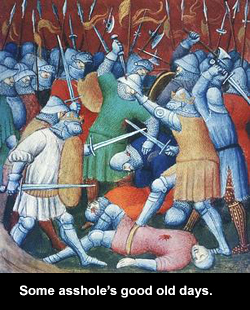 It’s hard for me to see how these calls for military action and pulling up the drawbridge aren’t simply appeals to cowardice. Seriously – the vast majority of the loudest hawks and anti-immigrant fanatics are also fierce defenders of an over-broad interpretation of the 2nd Amendment. Given that many, many more Americans are killed by heavily armed family members, neighbors, or strangers than by terrorism, this is an almost astonishing level of hypocrisy. Even more disturbing is the ludicrous background assumption, expressed most consistently on Morning Joe and by career hawks like John McCain, that if we had simply invaded Syria in 2012, all would be sweetness and light in that sorry nation today. Is there any factual basis for that assumption? The question never arises.
It’s hard for me to see how these calls for military action and pulling up the drawbridge aren’t simply appeals to cowardice. Seriously – the vast majority of the loudest hawks and anti-immigrant fanatics are also fierce defenders of an over-broad interpretation of the 2nd Amendment. Given that many, many more Americans are killed by heavily armed family members, neighbors, or strangers than by terrorism, this is an almost astonishing level of hypocrisy. Even more disturbing is the ludicrous background assumption, expressed most consistently on Morning Joe and by career hawks like John McCain, that if we had simply invaded Syria in 2012, all would be sweetness and light in that sorry nation today. Is there any factual basis for that assumption? The question never arises.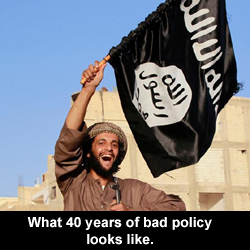 The trouble with approaching these issues with an imperial mindset is that we are blind to our own failures while expressing righteous indignation over the failings of others. Russia’s military action in Syria is a good example. They are perhaps the fifth or sixth power to drop bombs in that unfortunate country. Their strategy, while militaristic and morally bankrupt, is not difficult to understand – they view Islamic radicalism as an extreme threat, and they make the not unrealistic assumption that the fall of Syria’s government would result in a failed state something like Libya or Somalia or Iraq (all of which are beneficiaries of our aforementioned bellicosity). So, like the U.S.’s support of Saudi’s murderous campaign in Yemen, they are applying force in support of Assad’s crumbling regime.
The trouble with approaching these issues with an imperial mindset is that we are blind to our own failures while expressing righteous indignation over the failings of others. Russia’s military action in Syria is a good example. They are perhaps the fifth or sixth power to drop bombs in that unfortunate country. Their strategy, while militaristic and morally bankrupt, is not difficult to understand – they view Islamic radicalism as an extreme threat, and they make the not unrealistic assumption that the fall of Syria’s government would result in a failed state something like Libya or Somalia or Iraq (all of which are beneficiaries of our aforementioned bellicosity). So, like the U.S.’s support of Saudi’s murderous campaign in Yemen, they are applying force in support of Assad’s crumbling regime.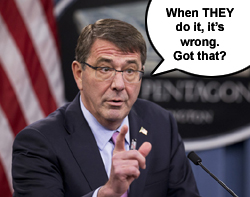 It is a bit maddening to see Defense Secretary Ash Carter denounce the Russians for being the gang that can’t shoot straight (which they apparently are) when only days ago our forces in Afghanistan blew up a Medecins Sans Frontieres hospital – an accident, of course (we seem to have a lot of them). While we’re railing against Putin, we might pause to remember that we have been in Afghanistan for fourteen years, and that the place is still ungovernable. We’ve been in Iraq for 12 years at some level or another, and large swaths of it are under the control of a group we profess to hate – ISIS or ISIL, nurtured in the government-free zone we carved out in the cradle of civilization, supported by Saudi and Turkey. (I guess the friends of our friends are somehow our enemies. And the enemies of our enemies … also our enemies. Have we no friends?)
It is a bit maddening to see Defense Secretary Ash Carter denounce the Russians for being the gang that can’t shoot straight (which they apparently are) when only days ago our forces in Afghanistan blew up a Medecins Sans Frontieres hospital – an accident, of course (we seem to have a lot of them). While we’re railing against Putin, we might pause to remember that we have been in Afghanistan for fourteen years, and that the place is still ungovernable. We’ve been in Iraq for 12 years at some level or another, and large swaths of it are under the control of a group we profess to hate – ISIS or ISIL, nurtured in the government-free zone we carved out in the cradle of civilization, supported by Saudi and Turkey. (I guess the friends of our friends are somehow our enemies. And the enemies of our enemies … also our enemies. Have we no friends?)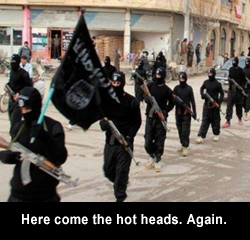 That’s just laying insult upon injury. Our troops suffered mightily alongside the people of Ramadi, and most of those now complaining did nothing to relieve their suffering in 2005; quite the opposite. The fact is, as
That’s just laying insult upon injury. Our troops suffered mightily alongside the people of Ramadi, and most of those now complaining did nothing to relieve their suffering in 2005; quite the opposite. The fact is, as  So, once again, we are on the verge of creating another catastrophe in Iraq, the predictable consequences of which will be a further radicalization of the Sunni community, just as our 2003 invasion gave rise to Al Qaeda in Iraq, the precursor of ISIS. Same story, over and over again, and we somehow expect a different ending. Our imperial foreign policy is an enemy manufacturing machine, as the past sixty years have amply demonstrated. Quite an efficient system; one generation is caught up with fighting the jihadists spawned by the one that preceded it.
So, once again, we are on the verge of creating another catastrophe in Iraq, the predictable consequences of which will be a further radicalization of the Sunni community, just as our 2003 invasion gave rise to Al Qaeda in Iraq, the precursor of ISIS. Same story, over and over again, and we somehow expect a different ending. Our imperial foreign policy is an enemy manufacturing machine, as the past sixty years have amply demonstrated. Quite an efficient system; one generation is caught up with fighting the jihadists spawned by the one that preceded it.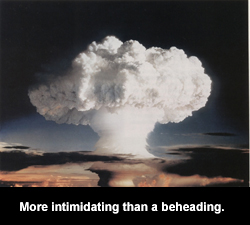 Okay, that’s all good. But as the president lists all of the horrors Islamic extremists have unleashed onto the world, there’s one question that begs to be asked: is ISIS responsible for more death than we are? How many Muslims have we dispatched over the last 15 years? Sure, ISIS is a bunch of crackheads, thugs, and killers. But they are bush league next to us. As all of these war-fevered pundits and Congresspeople run around fulminating over the “death cult” that is ISIS, do they give even a passing thought to our own 70 year history of threatening the entire planet with nuclear destruction? That’s not a “death cult”?
Okay, that’s all good. But as the president lists all of the horrors Islamic extremists have unleashed onto the world, there’s one question that begs to be asked: is ISIS responsible for more death than we are? How many Muslims have we dispatched over the last 15 years? Sure, ISIS is a bunch of crackheads, thugs, and killers. But they are bush league next to us. As all of these war-fevered pundits and Congresspeople run around fulminating over the “death cult” that is ISIS, do they give even a passing thought to our own 70 year history of threatening the entire planet with nuclear destruction? That’s not a “death cult”?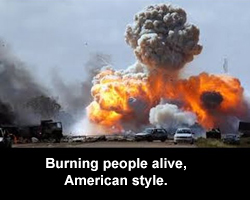 ISIS Killing. The so-called “Islamic State” burned a Jordanian captive alive this week. In retaliation, the Jordanian King executed some prisoners. Meanwhile, we dropped some bombs on some nameless people, some of which, quite possibly, were burned alive (though not in front of a camera). Your pick as to who is the biggest asshole here. On points of style, it’s a toss up. On volume, we win hands down.
ISIS Killing. The so-called “Islamic State” burned a Jordanian captive alive this week. In retaliation, the Jordanian King executed some prisoners. Meanwhile, we dropped some bombs on some nameless people, some of which, quite possibly, were burned alive (though not in front of a camera). Your pick as to who is the biggest asshole here. On points of style, it’s a toss up. On volume, we win hands down.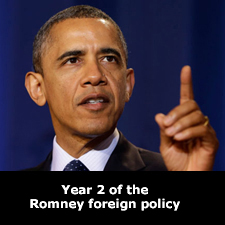 This is a cultivated disconnect, certainly no accident. Every day, the news media hammer away at the threat of Ebola, of ISIS, of Russia, and to a lesser extent North Korea and Iran. In the case of the former, we’re reaching a near hysteria about a virus that has affected only a handful of Americans, and only three cases in the U.S. The public has been worked up into such a lather that politicians are falling over themselves to try to benefit from it, take advantage of it, channel it in some way that is useful to them. One only wishes we could evoke this sort of reaction on actual threats, like our disastrous automotive transportation system that kills over 30,000 of us a year.
This is a cultivated disconnect, certainly no accident. Every day, the news media hammer away at the threat of Ebola, of ISIS, of Russia, and to a lesser extent North Korea and Iran. In the case of the former, we’re reaching a near hysteria about a virus that has affected only a handful of Americans, and only three cases in the U.S. The public has been worked up into such a lather that politicians are falling over themselves to try to benefit from it, take advantage of it, channel it in some way that is useful to them. One only wishes we could evoke this sort of reaction on actual threats, like our disastrous automotive transportation system that kills over 30,000 of us a year.